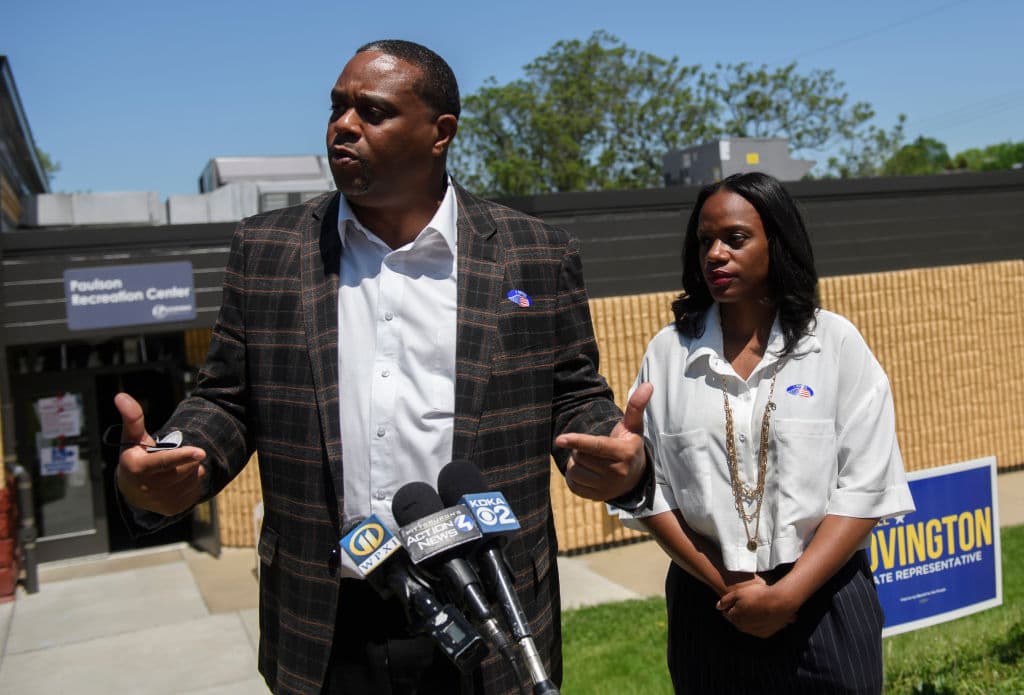A Public Labor Fight at Pittsburgh Exposes Democratic Party Divide
The split is illustrative of the widening gap within the Democratic Party between the social-justice warrior unions, like the SEIU, and more traditional labor unions.

PITTSBURGH — Last Monday, the president of the Laborers’ District Council of Pennsylvania, Philip Ameris, was standing on Grant Street watching the members of his union march down the main thoroughfare of the annual Pittsburgh Labor Day Parade, the day’s largest such celebration anywhere in the country, when he said he saw Mayor Ed Gainey hop over the barriers and jump in to join his labor force.
“So the union members march behind a truck that has a banner with our name on it, Mayor Gainey jumping in right behind our guys gives the impression that we support him and he supports us, that is the perception,” Mr. Ameris said in an interview.
“That is not, however, the reality, and I was having none of it,” he said.
The labor president said he walked straight over to Mr. Gainey, shook his hand, and both bluntly and colorfully told him to leave his position in the parade with his union members.
“I essentially said you can go walk with anyone else but not my members,” he said, adding, “He has not taken my calls for over a year, this from a man who we have supported throughout his career both with votes and with a lot of money, and he had no right to try to present it as though everything was good between us.”
More than 27,000 construction and public sector employees are represented by the Laborers’ District Council, and they had all been strident supporters of Mr. Gainey until recently after the mayor took a far left turn and put all his chips in with the social justice union Service Employees International Union.
When Mr. Gainey took office, he appointed top SEIU officials, such as Lisa Frank, as his chief administrative officer and the former SEIU Healthcare communications director, Maria Montano, as his press secretary.
In March, Mr. Gainey nominated the executive vice president of SEIU Healthcare Pennsylvania, Silas Russell, to the Planning Commission, a move considered controversial because of the conflict of interests it raises and just one of many SEIU members who hold significant influence in his administration.
The SEIU has also successfully brought other far-left candidates to office here in Western Pennsylvania. Representative Summer Lee is one of them, and Sara Innamorato hopes to be the next in November’s race for Allegheny County Chief Executive.
In a shock move, the Labor Council endorsed a moderate Republican, Joe Rockey, over Ms. Innamorato in that upcoming contest; other union leaders, however, have had their arms bent not to support Mr. Rockey for fear of losing power.
The split is illustrative of the widening gap within the Democratic Party between the social-justice warrior unions, such as the SEIU, and more traditional labor unions, with the former focusing on politics advanced by left-wing activists that are often noneconomic and the latter focusing on wages, benefits, and opportunities.
The split is no different than the split in the party over cultural issues that have peeled back to demonstrate that traditional liberals are weary of all of the identity politics that are being pushed by the progressives.
Mr. Ameris explained that since the beginning of Mr. Gainey’s political career as a local state legislator, his men and women were his biggest financial supporters. “He was someone who we talked to at least once a week, could count on to talk about what our members needed.”
Their rift came to a head over Christmas when the city called and said a big storm was coming and they would need to make his members, who work for the city, able to be on call. Mr. Ameris assured them they were and reminded Mr. Gainey’s office that, under their contract, overtime would be clocked because of the holiday. Mr. Gainey’s team said of course.
The snowstorm came and went, and the labor council employees did their jobs, keeping the streets and highways cleared in the city.
Then the men and women who worked over Christmas during the storm got their paychecks, and there was no overtime pay, Mr. Ameris explained, “So I picked up the phone and called Gainey and he didn’t pick up.”
It took hundreds of unanswered calls, a lot of pressure, and three months of waiting before they ever got paid.
The tension with Mr. Gainey has grown thanks to his handling of developers often pricing them out of doing business in the city, beginning with increasing the zoning fees for commercial projects a whopping 20-fold more than what they paid the year before.
And the upfront fees of $40,000 to do business at Pittsburgh are higher than in cities far larger than here, including Philadelphia and Nashville.
Mr. Ameris said there are several million square feet of dead real estate at Pittsburgh ready to be developed.
“When we aren’t building this, we are losing jobs, good jobs,” he said.
Creators.com

